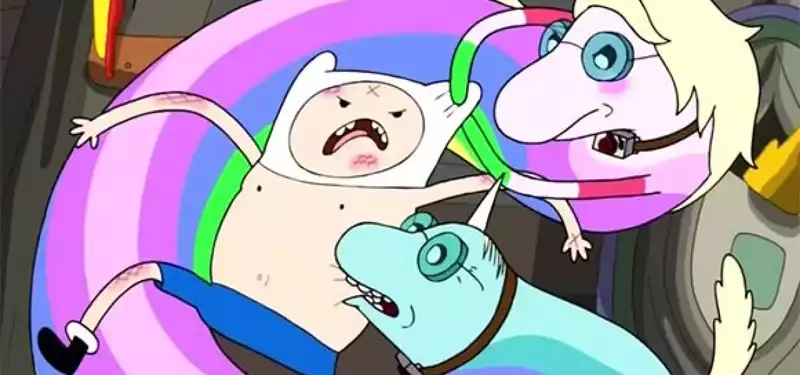Oct 1, 2014
How "Adventure Time" Revived Apocalyptic Storytelling
There is too much apocalyptic fiction in books, movies, television and video games. In the typical such stories, our world is broken by multi-million dollar special effects, civilization burns up like a tissue thrown into a furnace, and tattered survivors have to fight each other and their environment before Tom Cruise saves them... That's about it. There may be a religious message, and there is definitely an overt or hidden social message. Except for "Adventure Time," I'd like to throw everything else in the trash right now.
Adventure Time goes beyond the usual clichés and distortions of post-apocalyptic fiction to create something more honest, fun, and wholesome.
It is a common fallacy that people automatically revert to looting and barbarism in times of disaster. (If so, The Flintstones is a big lie.) As soon as the apocalypse comes, it is assumed that everyone will break into bondage wear stores, spend the rest of their lives dressed up as their favorite Mad Max character, and kill anyone who comes near them. That's simply not true, and it's lame storytelling. Read Rebecca Solnit's excellent book, A Paradise Built in Hell, to see how real people react in real disaster situations. The magnitude of the disaster does not change human nature. Adventure Time is about a relatively stable society growing up after the Mushroom Wars, and may be more realistic than the adult-oriented works.
The appearance of the post-apocalyptic world is stereotypical: ruined cities, silenced and buried, mutated and monstrous survivors. Even "Futurama" gave us a glimpse of this, with some mild ridicule. In "Adventure Time," the mangled, broken rubble tells us that this was once our world. Magic has been unleashed on the world, but it is unlikely to be disastrous.
Even the show's most terrifying villain, Licht, who appears in the second season, resembles the Horned King from Disney's film The Black Cauldron (1985), reminiscent of an animated world gone by, but rather than being left behind from a pre-apocalyptic world, Rather, it is the result of it. (And Chose Guth, with his Ed Wynn-inspired voice, must surely be a descendant of Ghandi.) Finn, who (presumably) appears as the only survivor, looks rather strange and alien under his hat and hood. When he first takes it off to reveal his blonde hair, there is a sense of relief.
The accidental genius of "Adventure Time" is that the apocalypse was added as the show developed. The intentional genius was the decision to keep the apocalypse secondary. Compare, for example, the post-apocalyptic children's TV shows of my youth. They ranged from the dystopian ("Return to the Planet of the Apes") to the quietly optimistic ("Ark II"). They were designed to be emotionally and structurally simple and, in the case of Ark II, vaguely educational. The success of Ark II, even though it only aired for one season, was that it engaged with a post-apocalyptic society, but without pessimism. [Animated feature films also range from the complex tone and storyline of Hayao Miyazaki's Nausicaa and the Valley of the Wind (1984) to the half-baked structure of Ralph Bakshi's The Magician's Journey (1977). In a poor post-apocalyptic novel, the backstory sets the tone and the characters are merely drifters drifting in the current. In good post-apocalyptic storytelling, the characters can create their own stories while still working in tandem with the backstory. Vampire Marceline is an example of this, aside from being the coolest vampire on television today. She transcends the standard vampire conventions and, as a result, is allowed to become an individual.
Finn and Jake are neither holy fools nor denizens of a new Eden. Survival is not the hardship that many apocalyptic fictions present. It can even be fun. I like to think of Finn and Jake as the same utopia as the protagonists of Harlan Ellison's famous story "Boy and Dog" (1969). There are monsters - no adventure is complete without monsters - but there are also friends.
And for those who say, "It's just a kids' show," remember that every generation is shaped by the stories they heard as children. Adventure Time brings a bit of its own flavor, a 21st century addition and a welcome one at that.
.



Post your comment